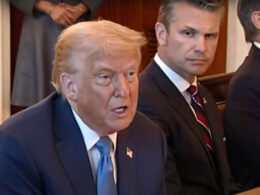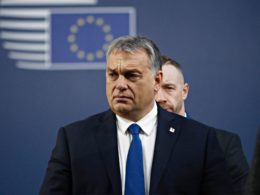Hungarian Deputy Prime Minister acknowledges the transfer of Ukrainian captive soldiers from Russia to Hungary, stating that they owe their freedom to the Russian Orthodox Church.
Vice Prime Minister of Hungary, Zsolt Semjén, has confirmed that 11 Ukrainian POWs of Hungarian descent were transferred from Russia to Hungary, as previously announced by the Russian Orthodox Church.
Semjén's comments were obtained by the Hungarian publication ATV. The Russian Orthodox Church (ROC) had earlier published a statement claiming that on 8 June, "as part of inter-church cooperation at the request of the Hungarian side, a group of Ukrainian captive soldiers of Transcarpathian origin who participated in combat actions" were handed over to Hungary.
According to the ROC's announcement, the agreement on the transfer of captive soldiers involved the participation of Antoniy, Chairman of the Department for External Church Relations of the ROC, Metropolitan of Volokolamsk, and Nikolay Balashov, advisor to the Russian Patriarch Kirill.
Earlier, RBC-Ukraine reported, citing sources, that the ROC planned to transfer a part of Ukrainian captives to Hungary without coordinating this decision with Ukraine. According to the same publication, one of the intermediaries was supposed to be the charitable organization Maltese Aid Service of the Sovereign Order of Saint John of Jerusalem, Knights of Malta.
According to ATV, the transfer of the captives was coordinated by Zsolt Semjén, the Hungarian Deputy Prime Minister responsible for church affairs. In a comment to the publication on Friday, Semjén declined to provide any details, citing "the interests of the case and the people." However, he stated that this gesture by the Russian Orthodox Church towards Hungary was a reason why these people "owe their freedom to it." Semjén emphasized, "This is my human and patriotic duty" regarding his role in coordinating the transportation of the 11 captive soldiers to Hungary.
Hungary's support for Russia in the war against Ukraine
Hungary, a NATO and EU member state, has been accused of undermining the bloc's solidarity with Ukraine, which has been fighting a war against Russian aggression since 2022. Hungary's Prime Minister Viktor Orban, who has cultivated close ties with Russian President Vladimir Putin over the past decade, has adopted a cautious and pragmatic stance on the crisis, balancing his country's interests with those of his allies.
Orban has condemned Russia's invasion of Ukraine but has avoided personal criticism of Putin. He has also refused to allow the delivery of arms to Ukraine via Hungary, unlike the other NATO states bordering Ukraine - Poland, Romania and Slovakia - and is strongly opposed to sanctions on Russian energy, a stance backed by many voters. He has repeatedly stated that "this is not our war" and that it is a "dispute that the relevant parties should settle among themselves."
Orban has also exploited the Ukraine crisis for domestic political purposes, casting the upcoming election in April 2023 as a choice between a leftist opposition that he says would drag Hungary into the war, and the peace and stability he insists only his conservative Fidesz party can offer. He has also used his veto power in the EU to block financial assistance and political support for Ukraine, citing grievances over the rights of ethnic Hungarians living in Zakarpattia Oblast.
Hungary, a predominantly Catholic country, has developed close relations with the Russian Orthodox Church, the largest and most influential religious institution in Russia. Hungary's Prime Minister Viktor Orban, who has maintained friendly ties with Russian President Vladimir Putin, has supported the church's activities and interests in Hungary and beyond.
Orban has praised the Russian Orthodox Church for defending "Christian values" and has allocated state funds for the construction and renovation of Orthodox churches in Hungary, where only about 14,000 of the nearly 10 million people are Orthodox. He has also welcomed Patriarch Kirill, the leader of the Russian Orthodox Church, to Hungary several times and has awarded him with Hungary's highest state honor.
Orban has also backed the Russian Orthodox Church's stance on the war in Ukraine, where it has sided with Russia and its proxies against the Ukrainian government and the Ukrainian Orthodox Church. Orban has opposed EU sanctions on Patriarch Kirill and other church officials for their role in inciting and supporting the invasion.
Hungary's stance on Ukraine has drawn criticism from other EU and NATO members, as well as from Ukrainian officials and media. They accuse Orban of playing into Putin's hands and weakening the bloc's unity and credibility. They also point out that Hungary benefits from Ukraine's security and stability, as well as from its European integration. Some analysts suggest that Orban's position on Ukraine may change after the election, depending on the outcome and the pressure from his allies.
Related:
- Hungary calls for “ceasefire” while featuring Ukraine map without Crimea – UNIAN
- Expert explains what Hungary’s troops were really up to at Ukraine border when Russia struck
- Hungary would not arrest Putin despite ICC ruling – official
- How the Russian Orthodox Church enabled Putin’s war against Ukraine
- Anatomy of treason: how the Ukrainian Orthodox Church sold its soul to the “Russian world”





